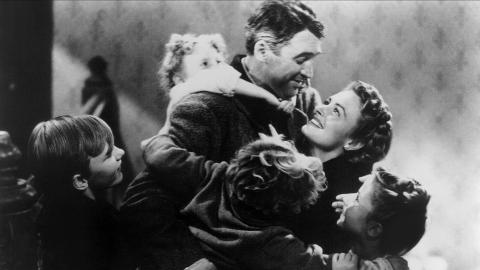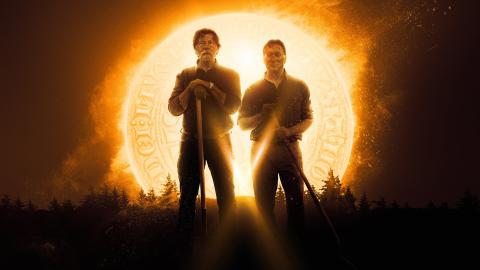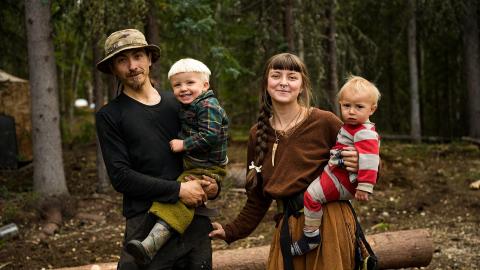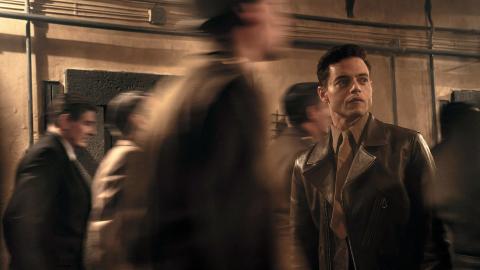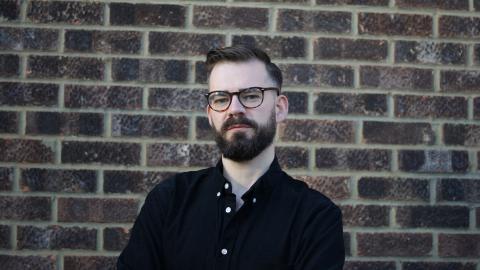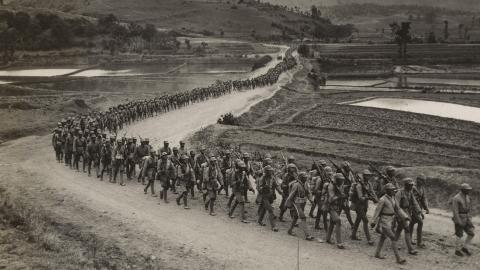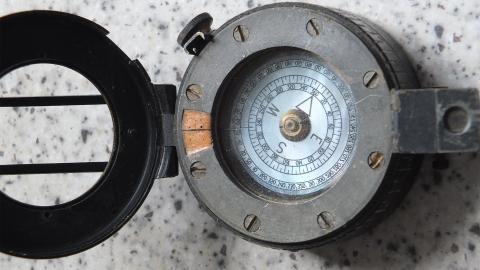Cyril Mowforth’s WW2 poetry
Having only recently married, Cyril Mowforth left to fight in the Second World War all the while creating an astonishing social history of the conflict within his correspondence with his wife, Olga.
Amongst the descriptions of what was going on (or at least those that avoided the censors), their thoughts and feelings, and the longing to return to the life they knew, Cyril wrote some incredibly accomplished poetry.
Episode 1: At Sea: Optimistic Goodbyes
Written in June 1941 while camped in North Africa, Cyril had not been apart from Olga for very long at this point. While they missed each other, there was a positive and somewhat adventurous tone to their letters.
Shall we stroll through lovely Wyming
Where first we walked together
Along that winding sandy drive
Midst pine trees and the heather.
Or shall we browse along the stream
That comes from Stanage Moor
Then take the road to Ringinglow
Where first we entered Dore.
Let’s once again across the heath
And o’er the hills to Strines
Where tinkling waterfalls beguile
The fern fronds ‘neath the pines.
Perhaps we’ll chase the river down
From friendly Derwent Hall
Past Leam and Bretton, Bakewell Bridge
What memories they recall.
Or wouldst through all the lovely dales
Of Yorks and Derby famed
The Dove and Lathkill, Swale and Wharfe
How aptly they are named.
But after all it matters not
What time or place or weather,
All these become mere novelties
When we walk together.
Episode 2: North Africa: lost messages
A frustration builds in the second episode as Cyril and Olga's letters become more and more out of sync, some being delayed by up to three months. Penned in December 1941, Cyril’s poem paints a picture of the arid conditions while fighting in North Africa.
Did you ever wander sweating
Through a plain of yellow dust
When the thought of sparkling water
Drives a man half mad with lust.
When you through the shimmering distance
See a lake and waving trees
Yet you know that when you get there
Though you grovel on your knees.
And scrape and scratch among the hummocks
You will find naught else but sand
And you’ll rave and curse the country
For a god-forsaken land.
Have you ever drunk salt water
It’s the only thing you’ve had
If you brew some tea and sweeten it
It doesn’t taste so bad.
But by itself it’s awful
And your thirst t’will never cure
Then you’ll know how precious water is
Just water, cold and pure.
Episode 3: Siege of Tobruk: Battlefields and Reality
Now seeing regular action, and the devastation that comes with it, Cyril’s moving poem that touches on the ‘highest price’ paid during the action that ultimately spells a major victory for the Allies in Africa.
They dream no more inspiring dreams of love and hope
Their hurts no longer ache with thoughts of home
No more will dawn bring light and then the fear
That day which follows is the last to come.
Their ears are deaf to hideous noise of metal against plate
And awful scream of steel at lightening speeds
That renders human flesh to something that
No longer feels the pain – no longer heeds.
Perhaps beneath some ridge or on deserted plain
Where in the cause of liberty they fought
And bitterly contested every inch of worthless ground
They lie at rest, their precious freedom bought.
Bought at the highest price that any man can pay
That, when passing time has dimmed the glory of their stand
The ignorants will with painful ceremony say
“They rest in peace on sacred hallowed ground
That is forever England” --
No dedication trimmed with laud and pomp
Can change this heap of rubble where they died
This filth infested ground that all men cursed
And cursed again yet valiantly defied.
Possession to the foe was in their hearts
A hated substitution for a dream
A mirage of the hills and winding lanes
That they would see no more.
Episode 4: El Alamein: Silence and Roses
A depression hangs over Cyril and Olga’s correspondence towards the end of Cyril’s time in North Africa, having spent many days in hospital with various ailments. Cyril writes the following poem in October 1942 from his tank, while trying to escape 'the pestilential flies'.
Thoughts of you unbidden surge
And clamour for admission
To drive me almost to the verge
Of insane blue condition.
The way you looked and walked
And memories of kissing
How you smiled and talked
Sweet reminiscing.
The very dust that chokes
And drives a man to swearing
Brings back somehow those jokes
To camouflage our caring
That oft we made in sweet collusion
To cover up our young confusion.
Episode 7: Bergen-Belsen: Sorrow and Shock
Inspired by the following line in a letter dated December 1944, Cyril writes a poem that expresses not just his yearning to get home to his wife, but also his desire to wrap up the task at hand.
'As usual when I reach the subject of weather it means I’ve exhausted all other topics – all that is except the one inexhaustible subject – You and I and me and you.'
You and I and me and you,
How we are and what we do,
Of whom we think, to whom we talk,
Of what we dream, with whom we walk.
Where we went, last week, last night,
Of things that come within our sight.
What we hope to do tomorrow,
Greetings, yearnings, joy and sorrow.
Relations’ news and neighbours’ chatters,
Gardening notes, financial matters.
These, the content of our days
Tell of parting, broken ways.
Writing! Writing! Words and phrases,
When what we crave are love’s embraces,
But only when all Fascists cease,
Shall we together live in peace.
Episode 8: Home at Last: Grief and Relief
The final part of the last episode features a poem from Cyril’s notebook that harks of the poignant poetry of The Great War.
In a world few understand
With a hard, blue blazing sky
On a frontier drawn in sand
Is where men chose to die.
Where the dust from the far dunes fills the tracks
And where the dawn rose red
Where the drift of the shapeless hills
Hide where the heroes tread.
There in the desert
Their blood shed for lost desires
Of fathers who died in the mud
‘Mid poppies and broken spires.
Listen to every episode of Letters of Love in WW2 on your favourite podcast app.

